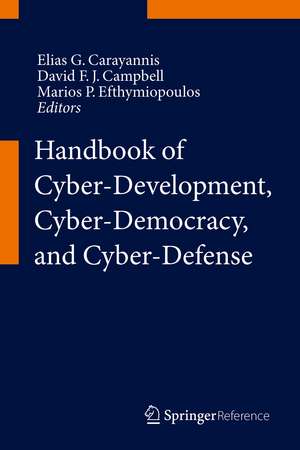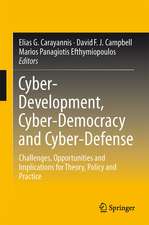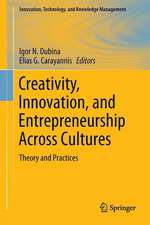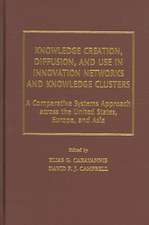Handbook of Cyber-Development, Cyber-Democracy, and Cyber-Defense
Editat de Elias G. Carayannis, David F. J. Campbell, Marios Panagiotis Efthymiopoulosen Limba Engleză Hardback – 18 oct 2018
Preț: 2655.03 lei
Preț vechi: 3493.47 lei
-24% Nou
Puncte Express: 3983
Preț estimativ în valută:
508.11€ • 528.51$ • 419.47£
508.11€ • 528.51$ • 419.47£
Carte tipărită la comandă
Livrare economică 10-16 aprilie
Preluare comenzi: 021 569.72.76
Specificații
ISBN-13: 9783319090689
ISBN-10: 3319090682
Pagini: 750
Ilustrații: XXIV, 1089 p. 132 illus., 85 illus. in color.
Dimensiuni: 155 x 235 mm
Greutate: 2.22 kg
Ediția:1st ed. 2018
Editura: Springer International Publishing
Colecția Springer
Locul publicării:Cham, Switzerland
ISBN-10: 3319090682
Pagini: 750
Ilustrații: XXIV, 1089 p. 132 illus., 85 illus. in color.
Dimensiuni: 155 x 235 mm
Greutate: 2.22 kg
Ediția:1st ed. 2018
Editura: Springer International Publishing
Colecția Springer
Locul publicării:Cham, Switzerland
Public țintă
ResearchCuprins
Citizenship Education and New Media: Opportunities and Challenges; Crowdsourcing Social Innovation: Towards a Collaborative Social Capitalism; Social Media Use and Smart City Management; Democratization in the Middle East and North Africa in Comparison: Turkey, Tunisia and Egypt; Consumerisation of IT, Cyber-Democracy and Cyber-Crime: The inherent challenges and opportunities of two ends of a continuum; Cyber-Democracy and Cyber-Defense; Political Advertisement and Cyber-development; Cyberspace: Do we need a new mindset?; Global Supply Chain Network Risk Analysis and Monitoring for Global Cyber Defence
Notă biografică
Dr. Elias G. Carayannis is Full Professor of Science, Technology, Innovation and Entrepreneurship, as well as co-Founder and co-Director of the Global and Entrepreneurial Finance Research Institute (GEFRI) and Director of Research on Science, Technology, Innovation and Entrepreneurship, European Union Research Center, (EURC) at the School of Business of the George Washington University in Washington, DC. Dr. Carayannis‘ teaching and research activities focus on the areas of strategic Government-University-Industry R&D partnerships, technology road-mapping, technology transfer and commercialization, international science and technology policy, technological entrepreneurship and regional economic development.
Dr. Marios-Panagiotis Efthymiopoulos is the Founder and CEO of Strategy International, a non-profit think tank in the service of global education, exchange knowledge and consulting in political, economic and strategic affairs. Dr. Efthymiopoulos has held a variety of international, academic and professional positions, namely at the Center for Transatlantic Relations, SAIS, Johns Hopkins University; George Washington University, Business School, EU Center for Excellence; Woodrow Wilson International Center for Scholars; and the Department of Social and Political Sciences, University of Cyprus. A frequently invited speaker, he has consulted to such organizations as the Hellenic Homeland Security Police, Joint War College of Greece, NATO Maritime Interdiction Operation and Training Center (NMIOTC), the UN and NATO training corps and the NATO Rapid Deployable Corps in Thessaloniki, Greece.
David F.J. Campbell has appointments at the Faculty for Interdisciplinary Studies, Alpen-Adria University; the University of Applied Arts, Vienna and the Department of Political Science, University of Vienna, where his research specialties include research financing, research evaluation and the science of science; comparative analyses political systems in democracies and the interaction between politics and economy; supranationality and empirical applications of systems theory and cybernetics. He has served as a Visiting Research Scholar in the Department of Management Science at The George Washington University; researcher and Lecturer at the Institute for Advanced Studies in Vienna; and visiting researcher at Georgetown University's Department of Government.
Dr. Marios-Panagiotis Efthymiopoulos is the Founder and CEO of Strategy International, a non-profit think tank in the service of global education, exchange knowledge and consulting in political, economic and strategic affairs. Dr. Efthymiopoulos has held a variety of international, academic and professional positions, namely at the Center for Transatlantic Relations, SAIS, Johns Hopkins University; George Washington University, Business School, EU Center for Excellence; Woodrow Wilson International Center for Scholars; and the Department of Social and Political Sciences, University of Cyprus. A frequently invited speaker, he has consulted to such organizations as the Hellenic Homeland Security Police, Joint War College of Greece, NATO Maritime Interdiction Operation and Training Center (NMIOTC), the UN and NATO training corps and the NATO Rapid Deployable Corps in Thessaloniki, Greece.
David F.J. Campbell has appointments at the Faculty for Interdisciplinary Studies, Alpen-Adria University; the University of Applied Arts, Vienna and the Department of Political Science, University of Vienna, where his research specialties include research financing, research evaluation and the science of science; comparative analyses political systems in democracies and the interaction between politics and economy; supranationality and empirical applications of systems theory and cybernetics. He has served as a Visiting Research Scholar in the Department of Management Science at The George Washington University; researcher and Lecturer at the Institute for Advanced Studies in Vienna; and visiting researcher at Georgetown University's Department of Government.
Textul de pe ultima copertă
This volume covers a wide spectrum of issues relating to economic and political development enabled by information and communication technology (ICT). Showcasing contributions from researchers, industry leaders, and policymakers, this Handbook provides a comprehensive overview of the challenges and opportunities created by technological innovations that are profoundly affecting the dynamics of economic growth, promotion of democratic principles, and the protection of individual, national, and regional rights. Of particular interest is the influence of ICT on the generation and dissemination of knowledge, which, in turn, empowers citizens and accelerates change across all strata of society.
Each essay features literature reviews and key references; definition of critical terms and concepts, case examples; implications for practice, policy, and theory; and discussion of future directions. Representing such fields as management, political science, economics, law, psychology, and education, the authors cover such timely topics as health care, energy and environmental policy, banking and finance, disaster recovery, investment in research and development, homeland security, and diplomacy in the context of ICT and its economic, political, and social impact.
Each essay features literature reviews and key references; definition of critical terms and concepts, case examples; implications for practice, policy, and theory; and discussion of future directions. Representing such fields as management, political science, economics, law, psychology, and education, the authors cover such timely topics as health care, energy and environmental policy, banking and finance, disaster recovery, investment in research and development, homeland security, and diplomacy in the context of ICT and its economic, political, and social impact.
Caracteristici
Overview of various economic and political developments enabled by ICT Features contributions from scholars, industry leaders and policymakers Includes discussions of current trends and future prospects Includes supplementary material: sn.pub/extras




















